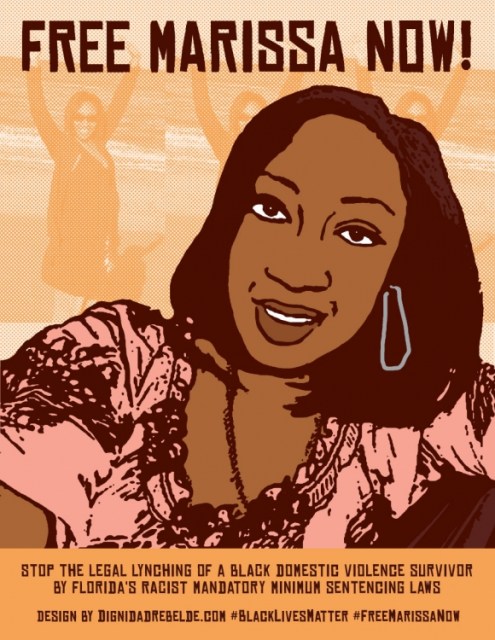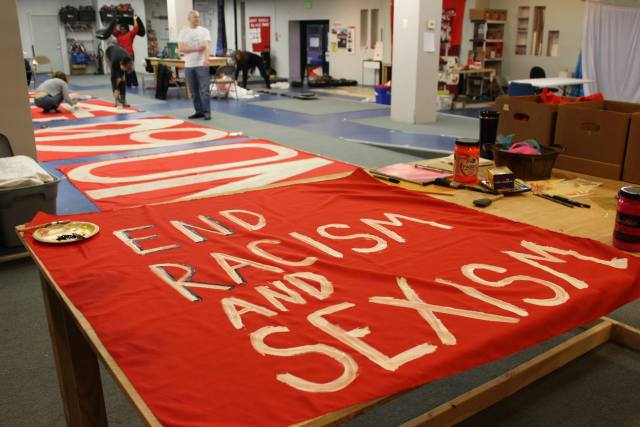In August 2010, Marissa Alexander fired a warning shot with a lawfully registered gun to keep her abusive and estranged husband from killing her in her home in Florida. No one was hurt, but Alexander was arrested and charged with three counts of assault with a deadly weapon.
After years of navigating the legal system and spending three years incarcerated, on Tuesday, January 27th, Alexander is expected to be released from the Duval County Jail. She will spend two years under house arrest while wearing an ankle monitor. Activists from around the country will converge on Jacksonville and in their home cities to stand in solidarity with Alexander and bring visibility to women who have been targeted for their resilience and survival.
“Forcing Marissa to serve even one day in prison represents a profound and systemic attack on black women’s right to exist and all women’s right to self-defense.” – Alisa Bierria
Here’s a quick history of Alexander’s case: in her initial trial, she was denied Stand Your Ground immunity (yes, the same Stand Your Ground immunity granted to George Zimmerman when he killed Trayvon Martin), and found guilty of three counts of domestic aggravated assault. She received a mandatory minimum sentence of 20 years in prison. Alexander appealed her trial successfully and was granted a re-trial. Florida state prosecutor Angela Corey sought to change the terms of Alexander’s sentence in the retrial to require her to serve three consecutive — rather than concurrent sentences — of 20 years, coming to 60 years in total. Again for the retrial, Alexander was denied Stand Your Ground immunity.
Before the trial, which was scheduled for December of 2014, Alexander accepted a plea deal. She plead guilty and accepted a sentence of three years in prison, including time served, followed by two years probation under house arrest while wearing an ankle surveillance monitor. Alexander’s deal left her with an “open plea,” which means it’s possible, though unlikely, that she could be required to spend the next two years in prison. The terms of the open plea leave this up to the discretion of Judge James Daniel.

Alexander’s plea and impending release do not amount to justice, as the organizers of the Free Marissa Now National Mobilization Campaign have made quite clear. Alexander is one of many black women who have been criminalized for fighting for their lives. In a press release from the day of the plea announcement, organizer Alisa Bierria noted,
“The absurdity in Marissa’s case was always the fact that the courts punished and criminalized her for surviving domestic violence, for saving her own life. The mandatory minimum sentences of 20 years, and then 60 years, just made the state’s prosecution increasingly shocking. But we have always believed that forcing Marissa to serve even one day in prison represents a profound and systemic attack on black women’s right to exist and all women’s right to self-defense.”
Ayanna Banks Harris, co-organizer with the Chicago Alliance to Free Marissa Alexander (CAFMA), added,
“Marissa will re-enter the world with a felony conviction, restricted with a 2-year house arrest, shackled with an ankle monitor, unemployed, with undetermined custody of her children and unable to vote for minimally 7 years. It is important to us that we don’t use the language that Marissa’s release from jail is equivalent to her being free. This is not freedom. This is simply a release from jail.”
As Maya Schenwar pointed out on Tom Dispatch, living under house arrest is a different kind of imprisonment. Under house arrest, Alexander is subject to the constant surveillance of the prison system, without the guaranteed access to food or legal materials, and with the additional financial burden of paying for her ankle monitor and its related fees, as well as the stigma of its constant presence on her body. Schenwar explained how house arrest strips people of their civil liberties:
In prison, the loss of one’s civil liberties is glaringly apparent. The strip search, the cell sweep, and the surveillance of letters, phone calls, and visits are givens. For those whose homes have been “prisonized,” however, basic constitutional rights also crumble. Probationers and monitorees are subject to warrantless searches and drug tests; probation officers have ready access to their homes. In fact, though seldom thought of this way, the ankle monitor is essentially a constant, warrantless search.
To draw attention to Alexander’s case, show solidarity on the day of her hearing, and to welcome her upon her release, activists from around the country are converging on Jacksonville, Florida. The Monument Quilt is preparing a display of quilt squares that have been made by activists all over the country showing solidarity with Alexander and sharing personal stories about domestic violence. The Quilt has been on tour all over the United States as it grows to tell the multilayered and multidimensional story of domestic violence. Rebecca Nagle, a Monument Quilt organizer and co-director of FORCE: Upsetting Rape Culture, said,
“I think the goal of the quilt being displayed at her hearing on Tuesday is to show Jacksonville and the world that she’s not alone. Awareness has been made around her case, which is really important, and there are also a lot of other women who go through a similar experience of being prosecuted for defending themselves. …The idea of a quilt is based in it being crowd-sourced. When we lay out the quilt in these spaces, we’re creating a highly visible representation of the experience of sexual assault and domestic violence that tells many stories instead of just one.”

In Chicago, Project NIA and CAFMA are co-sponsoring an event called “‘The Princess Who Went Quiet’: Talking to Kids About Incarceration,” where people will be able to discuss the impact of incarceration on children and families, and to distribute copies of Bianca Diaz’s new book, The Princess Who Went Quiet, which, according to Diaz was, “inspired by the stories that many people have shared with me about how incarceration has impacted their own lives, the lives of their family members and the life of their communities.”
Banks Harris noted the importance of centering the lives of the families and children of incarcerated people: “Though it’s clear the ways in which Marissa’s life has been disrupted by her unwarranted criminalization, often the impact on the family of those incarcerated is too often ignored and can be ambiguous.”
Assuming Alexander is released as expected on Tuesday, the organizing will not stop. The next wave of organizing was kicked off by a ten-day campaign to raise money to cover the ankle monitoring fees Alexander will accrue over her two years of house arrest. The campaign met its fundraising goal in three days, and it continues to raise money to support the future needs of Alexander and other women in similar situations. As Banks Harris said, “this work will also continue outside of Marissa’s case to assist the other ‘Marissas’ and move to create a society that doesn’t criminalize those who interrupt the violence being inflicted upon them.”

You can donate to the Free Marissa Now National Mobilization Campaign or buy merchandise from the Free Marissa Alexander Store.
Learn more about adding to the Monument Quilt or bringing it to your city








Comments
How does Florida keep botching shit like this up all the time? Is there like something in the water that is causing the court system/people in Florida to not see the obvious?
Unfortunately, it’s not just Florida. We’ve seen time and time again, in courts all over the country, that when black women save their own lives, they are criminalized. Racism, sexism, transphobia, transmisogyny, homophobia… that’s what’s in the water.
Thank you for this Maddie! I feel like there are so many aspects of her case that sometimes confuse me, and you laid them out super clearly.
Thank you for this update.